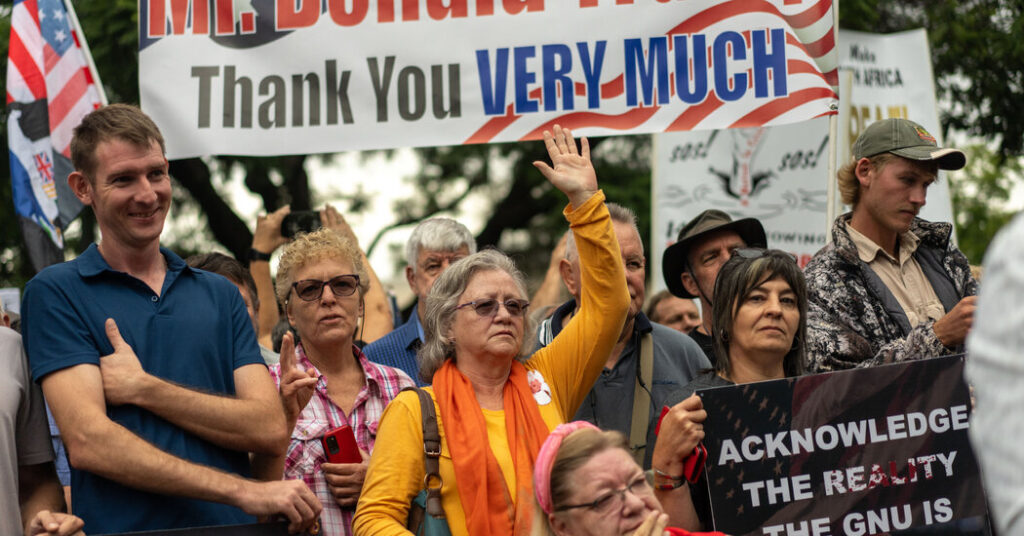Do Afrikaners want to leave South Africa for the US?
As discussions swirl around President Donald Trump’s controversial offer for white Afrikaners in South Africa to relocate to the United States as refugees, many within the Afrikaner community express their strong ties to their homeland and dismiss claims of widespread persecution. One such individual is Ulrich Janse van Vuuren, a 38-year-old social media influencer with over a million followers. Van Vuuren passionately shares South Africa’s beautiful landscapes and cultural heritage, stating, “For me, South Africa is home. It’s a place where my roots and heritage are, where I can contribute to the story of our nation and make a meaningful impact.”
Recently, the arrival of a small group of Afrikaners in the US seeking refuge has ignited a debate about the status and conditions of this demographic in South Africa. Trump and his supporter, South African-born billionaire Elon Musk, allege that Afrikaners face persecution and even a “genocide,” claims that have been widely discredited. While it is true that some farmers have been victims of violent crime, statistics reveal that the nation experiences alarmingly high murder rates, indicating that violence affects all demographics.
Local Sentiment
Van Vuuren asserts that those who left are not fleeing oppression but rather are “opportunists” who have enjoyed relative privileges in a country where systemic racial inequality persists. He believes that the current debates surrounding Afrikaners have only intensified his resolve to contribute positively to South Africa.
Thirty years post-apartheid, the economic realities starkly contrast white Afrikaners and the black majority, with the former enjoying significantly higher average living standards. Van Vuuren points out that Afrikaners identify as fully African, each echoing a complex sense of belonging to the nation, rooted in a history that stretches back centuries.
Challenges Facing Afrikaners
Despite a strong sense of identity, dissatisfaction persists within portions of the Afrikaner community regarding the high crime rates and the government’s policies addressing economic inequality. A newly enacted law allows for land expropriation without compensation, stoking fears among white landowners, particularly farmers.
On a micro-scale, the turmoil is exemplified by Ilse Steenkamp, a 47-year-old farmer and Afrikaner who recently lost her land to illegal occupation. She has applied for refugee status in the US, feeling her family has been left vulnerable due to government inaction regarding farm attacks. Steenkamp’s emotional journey reflects both the challenges of living with high crime rates and the broader implications of land reform laws that, according to her, target farmers unjustly.
The Refugee Status Controversy
| Criteria for Refugee Status | Details |
|---|---|
| Nationality | South African |
| Racial Status | Afrikaner or from a racial minority |
| Past Persecution | Citable incident of past persecution or fear of future persecution |
As more Afrikaners consider the implications of seeking refuge in the US, the discourse around their alleged victimization remains divisive. While some, like Sam Busà, see a genuine need to escape an environment fraught with insecurity and mental anguish, critics argue that the situation in South Africa does not constitute systemic persecution.
Conclusion
In the face of these challenges, organizations such as AfriForum and the Solidarity Movement maintain their commitment to remaining in South Africa, focusing on creating a future for Afrikaners within the country. As President Cyril Ramaphosa articulated, the seeming flight of some offers a glimpse into ongoing struggles with transformation and acceptance amidst a society grappling with a tumultuous past.
Ultimately, while a small faction chooses to seek refuge abroad, the majority of Afrikaners, as represented by figures like Van Vuuren, express their unwavering intention to stay and contribute to the evolving narrative of South Africa.


